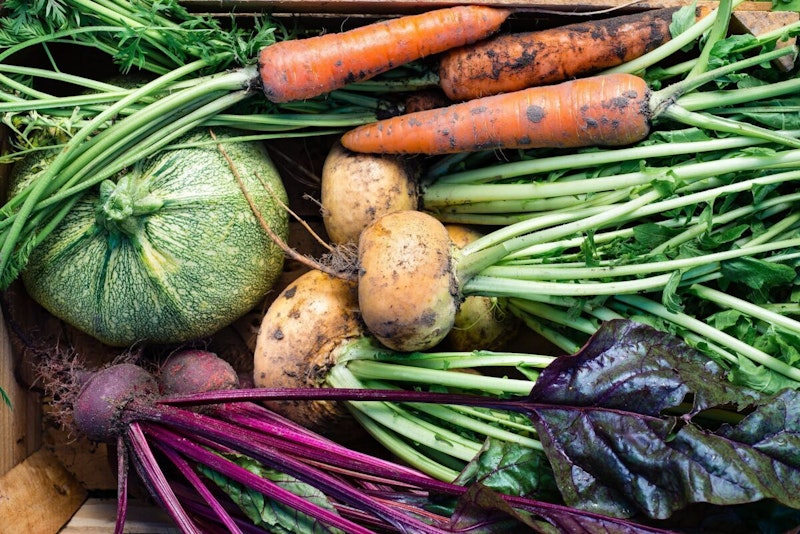Study Notes
GCSE Geography | Sustainable Food Production (Resource Management - Food 7)
- Level:
- GCSE
- Board:
- AQA, Edexcel, OCR, Eduqas
Last updated 17 Oct 2024
Many people are concerned that current strategies to increase food supply are not sustainable in the long-term as they require intensive inputs and damage the environment, and that we should be moving towards sustainable food production methods that maintain food supplies for the future, without harming land or water resources, and uses minimal energy inputs. Sustainable food production is also more appropriate for communities in LICs and NEEs who cannot afford large-scale agricultural practices.
Sustainable food production has three key components:
- Social - good quality food supply that is reliable and increases food security; the food is also safer to eat as it doesn't use chemicals; and the variety of food means people have access to a nutritional diet, improving their health
- Economic - it should provide sustainable livelihoods for those involved in farming, whether they are in LICs, NEEs or HICs, and should help local economies thrive
- Environmental - it's environmental impacts should be minimal, such as not using chemicals or destroying habitats, and reducing greenhouse gas emissions to help in the fight against climate change
There are lots of different strategies being used to increase food supply sustainably...
Organic farming
Organic farming is producing food locally without the use of chemicals, which is much better for the environment and tastes better. However, because production and labour costs are higher than in other forms of farming, organic produce is more expensive to buy. It also has lower yields per hectare, so less food is produced to feed the population.
Click here for more information.

Permaculture
Permaculture (permanent agriculture) is food production which follows the patterns and features of natural ecosystems to minimise the impact on the natural environment. It includes harvesting rainwater, composting waste and re-designing gardens to include a wide variety of plants and trees which provide a range of wildlife habitats. Permaculture practices include crop rotation, keeping animals like sheep and pigs, and bees, and managing woodland. It also uses natural predators like ladybirds instead of chemical pesticides, and natural fertilisers such as manure to add nutrients to the soil.

Urban farming
Urban farming is the cultivation, processing and distribution of food in and around settlements - sometimes using allotments, but also using some more interesting ideas, such as vertical farming in old office spaces, or even making use of old underground tunnels. These farms help with urban greening by increasing the green spaces in towns and cities, absorbing pollutants to improve air quality, increasing infiltration to reduce the risk of flooding, and increasing urban wildlife habitats by attracting wildlife such as birds and butterflies.
Urban farming is community-based and offers people the opportunity to work together on joint food-based projects. In HICs permaculture is move of a social movement to get people to engage more with food production and are very small-scale, whereas in LICs they are a much more important aspect of food supply, providing jobs and increasing access to a varied diet.

Seasonal food
This is part of the above three strategies and is how we used to eat, when we bought food from local farms or markets and could only buy whatever fruit and vegetables were in season - whereas now, because of better storage and faster transport around the world, it is possible to eat every type of food throughout the year! Eating seasonal produce, bought locally, is much more sustainable as it reduces food miles and therefore reduces our carbon footprint. It usually tastes better too.
Sustainable meat and fish
Many people will argue that to be truly sustainable we need to not be eating meat at all due to the environmental costs involved, particularly when we think about livestock that is kept inside and intensively reared with grain. However, grazing livestock outdoors so they are pasture-fed is a much more sustainable way of producing meat, and sheep and cattle can actually be used to maintain the landscape. Free-range farming where animals are able to spend most of their time outdoors is seen as a much better way of farming, which is also kinder to the animals involved. In the UK we use the Freedom Food label so customers can see that the meat they are buying has been reared in this way.
One of the big issues with fishing is the overfishing of certain species so they cannot recover, leading to a huge decline in population. This happened with cod stocks in the Atlantic, which eventually did start to recover when limits were placed on how many cod could be caught, and other types of fish were promoted instead.
Sustainable fishing either uses fishing grounds where the population of a species being fished can be maintained forever (although it can be difficult to assess fish populations accurately), and that damage is not being done to fishing waters or the food web. Or it uses fish farms (see photo below), where many fish are farmed sustainably, including shellfish, such as mussels and freshwater fish, such as trout. However, there are issues with fish farming in that it can introduce diseases to populations of wild fish and the water can become contaminated with the chemicals and drug treatments used in intensive farmed systems.
Sustainable fishing also considers the methods used to catch fish - using a pole and line or diving for shellfish is much more sustainable than using large nets as other species, such as dolphins and turtles can get caught in the holes (which are then returned dead to the sea), or than seabed dredging or bottom trawling which causes widespread damage to the seabed ecosystem.

You might also like
What is a Resource?
Study Notes
Energy - the Coal Trade
Study Notes
Energy - the Oil Trade
Study Notes

When the new Resource Frontier is on the sea bed 2km below the surface
13th September 2017
McDonalds to start using paper straws
18th June 2018
Resource Management: Energy - GCSE MCQ Quiz
Quizzes & Activities
‘Clear the Deck’ Interactive Revision Quiz for Paper 2: Resource Management - UK
Quizzes & Activities
Daily Email Updates
Subscribe to our daily digest and get the day’s content delivered fresh to your inbox every morning at 7am.
Signup for emails